Transcription of Chapter 6 – Civil Case Procedures - Judiciary of Virginia
1 GENERAL DISTRICT COURT MANUAL Civil CASE Procedures Page 6-1 Office of the Executive Secretary Department of Judicial Services Rev. 01/22 Chapter 6 Civil Case Procedures Introduction Civil cases are brought to enforce, redress, or protect the private rights of an individual, organization or government entity. The remedies available in a Civil action include the recovery of money damages and the issuance of a court order requiring a party to the suit to complete an agreement or to refrain from some activity. The party who initiates the suit is the plaintiff, and the party against whom the suit is brought is the defendant.
2 In Civil cases, the plaintiff must prove his case by a preponderance of the evidence. Any person who is a plaintiff in a Civil action in a court of the Commonwealth and a resident of the Commonwealth or a defendant in a Civil action in a court of the Commonwealth, and who is on account of his poverty unable to pay fees or costs, may be allowed by the court to sue or defendant a suit therein without paying fees and costs. The person may file the DC-409, PETITION FOR PROCEEDING IN Civil CASE WITHOUT PAYMENT OF FEES OR COSTS . In determining a person s ability to pay fees or costs on account of his/her poverty, the court shall consider whether such person is current recipient of a state and federally funded public assistance program for the indigent or is represented by legal aid society, including an attorney appearing as counsel, pro bono or assigned or referred by legal aid society.
3 If so, such person shall be presumed unable to pay such fees and costs. Va. Code :4 and Va. Code The following subsections provide a quick summary of the jurisdiction and venue requirements and the available discovery Procedures in general district court. Jurisdiction Va. Code and Va. Code The general district court has exclusive original jurisdiction over any claim not exceeding $4,500, excluding interest and attorney s fees. The general district court has concurrent jurisdiction with the circuit court for Civil actions on contract for any claim in excess of $4,500 and up to and including $25,000; and concurrent jurisdiction with circuit court in tort claims in excess of $4,500 up to and including $50,000, excluding interest and attorney s fees claimed.
4 However, cases involving liquidated damages for violations of vehicle weight limits, or cases involving forfeiture of bond, claims, counter-claims, and cross-claims filed in actions for unlawful entry or detainer, are not subject to the maximum jurisdictional limit applicable in general district court, regardless of the purpose for which the occupant is using the premises. (Commercial and residential) GENERAL DISTRICT COURT MANUAL Civil CASE Procedures Page 6-2 Office of the Executive Secretary Department of Judicial Services Rev. 11/21 The general Civil jurisdiction statute for general district courts sets forth additional situations in which district courts have jurisdiction, whether it is exclusive or concurrent with the circuit courts.
5 A court must have jurisdiction over the parties and the action in order to hear the case. While a matter is pending in a general district court or a circuit court, upon motion of the plaintiff seeking to increase or decrease the amount of the claim, the court shall order transfer of the matter to the general district court or circuit court that has jurisdiction over the amended amount of the claim without requiring that the case first be dismissed or that the plaintiff suffer a nonsuit, and the tolling of the applicable statutes of limitations governing the pending matter shall be unaffected by the transfer. Where such a matter is pending, if the plaintiff is seeking to increase or decrease the amount of the claim to an amount wherein the general district court and the circuit court would have concurrent jurisdiction, the court shall transfer the matter to either the general district court or the circuit court, as directed by the plaintiff, provided that such court otherwise has jurisdiction over the matter.
6 Except for good cause shown, no such order of transfer shall issue unless the motion to amend and transfer is made at least 10 days before trial. The plaintiff shall pay filing and other fees as otherwise provided by law to the clerk of the court to which the case is transferred, and such clerk shall process the claim as if it were a new Civil action. The plaintiff shall prepare and present the order of transfer to the transferring court for entry, after which time the case shall be removed from the pending docket of the transferring court and the order of transfer placed among its records. The plaintiff shall provide a certified copy of the transfer order to the receiving court.
7 Va. Code While a matter is pending in a general district court, upon motion of the plaintiff seeking to increase the amount of the claim, the court shall order transfer of the matter to the circuit court that has jurisdiction over the amended amount of the claim without requiring that the case first be dismissed or that the plaintiff suffer a nonsuit, and the tolling of the applicable statutes of limitations governing the pending matter shall be unaffected by the transfer. Except for good cause shown, no such order of transfer shall issue unless the motion to amend and transfer is made at least 10 days before trial.
8 The plaintiff shall pay filing and other fees as otherwise provided by law to the clerk of the court to which the case is transferred, and such clerk shall process the claim as if it were a new Civil action. The plaintiff shall prepare and present the order of transfer to the transferring court for entry, after which time the case shall be removed from the pending GENERAL DISTRICT COURT MANUAL Civil CASE Procedures Page 6-3 Office of the Executive Secretary Department of Judicial Services Rev. 01/22 docket of the transferring court by updating the pending case with O and TR in the case management system and the order of transfer is placed with the case papers.
9 The plaintiff shall provide a certified copy of the transfer order to the receiving court. Va. Code Venue Venue refers to the place of trial, the particular county or city in which a case must be heard. See Va. Code and Virginia Code (preferred venue) and Va. Code (permissible venue), list several different types of actions and the places in which venue would be proper for each action. In order for venue to be proper, it must be in accordance with these sections. Va. Code A defendant may object to the choice of venue, but it is within the court s discretion whether or not to grant the request for a venue transfer.
10 Va. Code ; , and Further, an objection to improper venue does not result in a dismissal, but in a transfer of the action to a proper venue. Va. Code Discovery Procedures Discovery Procedures in the general district courts are limited to the following: subpoena duces tecum , to parties and non-parties. Va. Code Evidence of medical reports or records; testimony of health care provider orcustodian of records. Va. Code Bill of particulars (filed by plaintiff at judge s request). Va. Code :1. Grounds of defense (filed by defendant at judge s request). Rule 7B:2. Interrogatories (following issuance of a fieri facias upon a judgment rendered ingeneral district court).


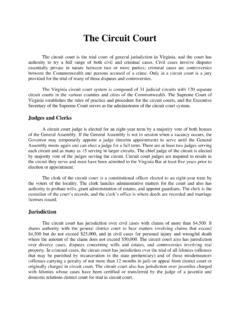

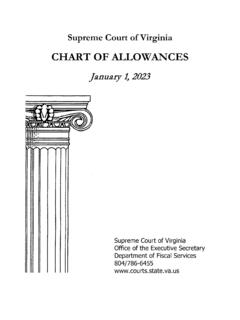
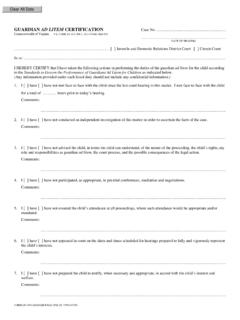
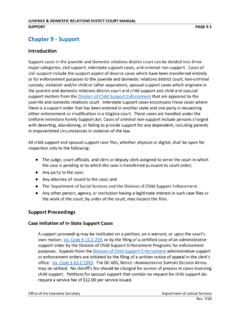
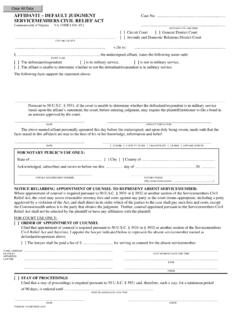


![SUBPOENA DUCES TECUM Commonwealth of Virginia [ ] …](/cache/preview/5/2/a/a/2/4/5/7/thumb-52aa24577bbd7576dedd772825f4d313.jpg)
